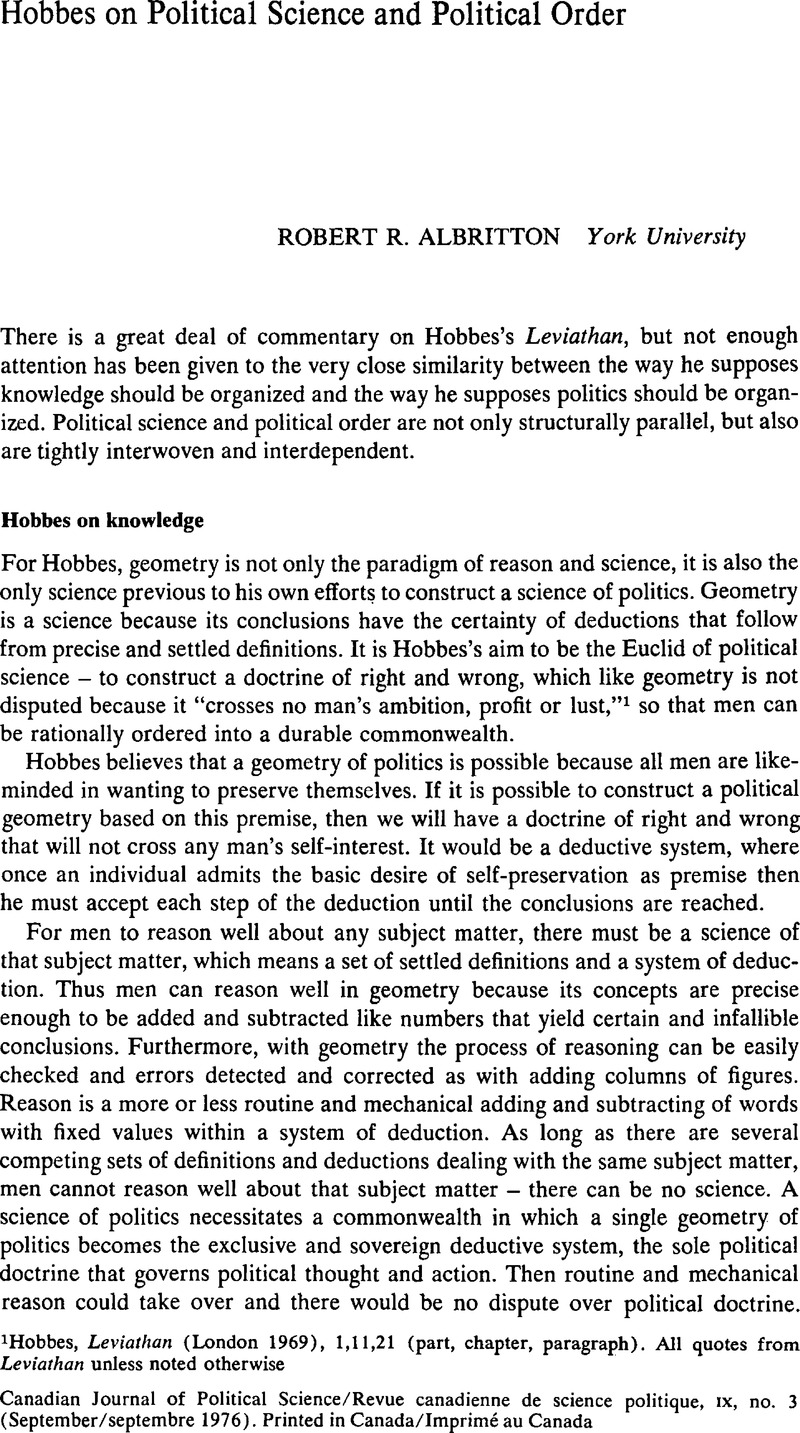Article contents
Hobbes on Political Science and Political Order
Published online by Cambridge University Press: 10 November 2009
Abstract

- Type
- Articles
- Information
- Canadian Journal of Political Science/Revue canadienne de science politique , Volume 9 , Issue 3 , September 1976 , pp. 464 - 472
- Copyright
- Copyright © Canadian Political Science Association (l'Association canadienne de science politique) and/et la Société québécoise de science politique 1976
References
1 Hobbes, , Leviathan (London 1969), 1, 11,21Google Scholar (part, chapter, paragraph). All quotes from Leviathan unless noted otherwise
2 Hobbes, 1, 4, 12
3 Hobbes, 1, 11, 22
4 Hobbes, 2, 26, 26
5 Hobbes, 1, 11, 19
6 Hobbes, 1, 11, 19
7 Hobbes, 1, 8, 16
8 Hobbes, 1, 8, 16–23
9 Hobbes, 1, 8, 23
10 Hobbes, 1, 8, 3
11 Hobbes, 2, 27, 20
12 Hobbes, Answer to Davenant, quoted from Wiley, Basil, The Seventeenth Century Background (Garden City, NJ. 1953), 216–17Google Scholar
13 Hobbes, 1, 8, 10
14 Hobbes, 1, 8, 27
15 Hobbes, 1, 5, 16
16 Wolin, S., Politics and Vision (Boston 1960), 265Google Scholar
17 Hobbes, 1, 8, 8
18 Hobbes, 1, 8, 8
19 Hobbes, 2, 31, 41
20 Hobbes, 1, 16, 4
21 Hobbes, 1, 11, 7
22 The “cloister” metaphor is quite appropriate. “And yet is this doctrine still practiced; and men judge the goodness of wickedness of their own, and of other men's actions, and of the actions of the commonwealth itself, by their own passions; and no man calleth good or evil, but that which is so in his own eyes, without any regard at all to public laws; except only monks, and friars, that are bound by vow to that simple obedience to their superior to which every subject ought to think himself bound by the law of nature to the civil sovereign.” Hobbes, 4, 46, 30
23 Hobbes, 1, 5, 20
24 Hobbes, 1, 8, 10
25 Hobbes, 1, 5, 20
26 Hobbes, 2, 20, 19
27 Hobbes, 2, 25, 12
28 Hobbes, 2, 25, 6
29 Hobbes, 1, 6, 53
30 Hobbes, 2, 25, 8
31 Hobbes, 2, 31, 8
32 One would expect a good deal of weeping in Hobbes's commonwealth, for “they are most subject to it, that rely principally upon helps external, such as are women, and children.” 1, 6, 42
33 Hobbes, 2, 30, 6
- 2
- Cited by


